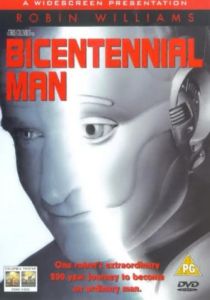| Bicentennial Man was stung at the 1999 box office, due no doubt in part to poor timing during a backlash against Robin Williams and his treacly performances in two other, then-recent, releases, Jakob the Liar and Patch Adams. But this near-approximation of a science-fiction epic, based on works by Isaac Asimov and directed, with uncharacteristic seriousness of purpose, by Chris Columbus (Mrs Doubtfire), is much better than one would have known from the knee-jerk negativity and box-office indifference. Williams plays Andrew, a robot programmed for domestic chores and sold to an upper-middle-class family, the Martins, in the year 2005. The family patriarch (Sam Neill) recognizes and encourages Andrew's uncommon characteristics, particularly his artistic streak, sensitivity to beauty, humour and independence of spirit. In so doing, he sets Williams's tin man on a two-century journey to become more human than most human beings. As adapted by screenwriter Nicholas Kazan, the movie's scale is novelistic, though Columbus isn't the man to embrace with Spielbergian confidence its sweeping possibilities. Instead, the Home Alone director shakes off his familiar tendencies to pander and matures, finally, as a captivating storyteller. But what really makes this film matter is its undercurrent of deep yearning, the passion of Andrew as a convert to the human race and his willingness to sacrifice all to give and take love. Williams rises to an atypical challenge here as a futuristic Everyman, relying, perhaps for the first time, on his considerable iconic value to make the point that becoming human means becoming more like Robin Williams. Nothing wrong with that. -- Tom Keogh, Amazon.com |
